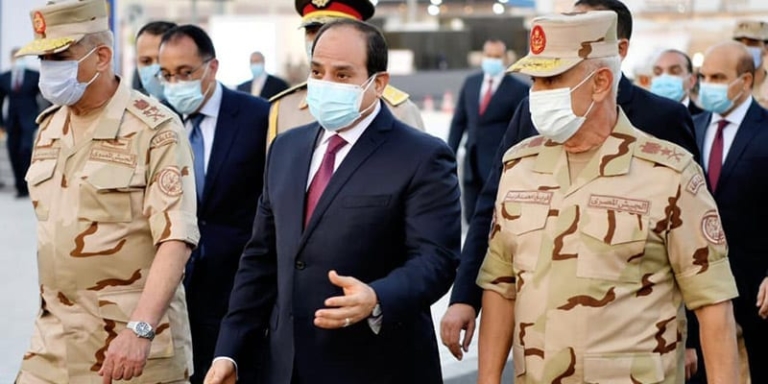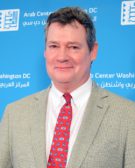
Many months have passed since the novel coronavirus epidemic began, with wide-ranging and often devastating health, economic, and social ramifications. The political consequences have likewise been far-reaching. Governments around the world have been battered by perceived failures to respond effectively to the pandemic. This is no less true in the Middle East, where infections accelerated over the summer. They were made worse in several cases by civil war and economic collapse.
The authoritarian response reflex kicked in swiftly, as it did in China. Governments in the Middle East and North Africa initially sought to deflect blame and disguise failures, launching disinformation and misinformation campaigns and arresting or intimidating critics.
Some of the most egregious coronavirus-related crackdowns have taken place in the two most populous countries in North Africa, Algeria and Egypt; together, they account for about 56 percent of the region’s infections. This is not a coincidence. Rather, it reflects the fact that both countries face serious political discontent that authorities worry could boil over as the strain of the COVID crisis lays bare failures of governance. And both see it as an opportunity to expand their authority and rid themselves of some of their most troublesome critics.
The danger here is not merely that the authoritarian response to the pandemic compounds the failures of government to craft an effective strategy, making a bad situation worse. It is also that political crackdowns will become permanent, a further long-term setback to prospects for human rights and political freedom.
Algeria: Finding Opportunity in Crisis
Algeria has been roiled by political turmoil since Abdelaziz Bouteflika, the country’s octogenarian long-serving president, announced his reelection bid in February 2019. Many Algerians had had enough; protesters took to the streets in numbers massive enough to force Bouteflika to withdraw at the behest of the military. A tense standoff went on for months as the burgeoning activist movement, known as the Hirak, stayed in the streets to press for sweeping political changes, while the authorities refused to accede to anything more than cosmetic reforms.
Amid the scramble to address the public health crisis, the Algerian government saw an opportunity to deal with the Hirak as well.
Then the pandemic struck. Amid the scramble to address the public health crisis, the Algerian government saw an opportunity to deal with the Hirak as well. In March, Prime Minster Abdelaziz Djerad said that, faced with a “multidimensional crisis,” Algerians should stop making so many demands of the government, end the demonstrations, and go home. Hirak activists largely cooperated, voluntarily standing down from organizing new protests. The government soon moved to close off Algeria’s borders, prohibit social gatherings, shutter schools, mosques, and other community places, and eventually impose curfews and lockdowns. As the new virus-related measures took effect, the number of protests diminished significantly.
With protesters off the streets, the government was able to focus increased attention on targeting individual journalists, bloggers, and activists. It ramped up a campaign of arrests aimed at Hirak leaders that began last year, and in April closed down a number of news websites and promulgated new legislation that criminalized spreading “false news.” Over the summer the Algerian authorities continued to arrest, interrogate, and imprison Hirak activists, taking many into custody on charges such as “inciting an unarmed gathering” or “undermining national integrity.” A wide variety of other vague and over-broad accusations have been utilized to jail individuals such as Hicham Sahroui, a Hirak figure accused of insulting the president, and a dozen other activists charged with “attacks on the territorial integrity of the state” in May. No Hirak activists jailed by the regime were among the 5,000 prisoners released in March to mitigate the spread of the coronavirus in the detention system.
Algerian activists and international human rights organizations have decried the authorities’ use of the virus as cover for the crackdown; indeed, it seems the protesters have been forced to play by one set of rules for public health reasons, while the government appears to be playing by quite another. The worry now is that once the health crisis eases, the Hirak movement will find it difficult to regain lost momentum, especially with so many people silenced or imprisoned while attention was focused elsewhere.
Egypt: Quieting Critics and Settling Scores
The military government in Cairo has steadily tightened its grip on power, intensified human rights abuses, and crushed political dissent since it took over in a 2013 coup. It came as no great surprise, then, that the regime treated the pandemic primarily as an excuse to expand its control. While initially playing down the seriousness of the crisis, Egyptian authorities withdrew the credentials of foreign journalists whose reporting contradicted government accounts, arrested a number of individuals for “spreading false news” about the pandemic, and attempted to blame the Muslim Brotherhood and even the general public for the disaster.
The government also wasted little time in moving to extend President Abdel-Fattah el-Sisi’s authorities. In April it introduced a package of 18 amendments to the emergency law, ostensibly to address a “vacuum” in law that the coronavirus crisis exposed. Only five of the amendments dealt directly with public health issues. The rest of the package, passed by parliament on April 22nd, granted President Sisi significantly expanded authority over a wide range of aspects of Egyptian life. For one thing, the amendments gave the president authority to task the security and military forces directly, bypassing the chain of command. The amendments significantly expanded the already considerable arrest powers of the military and the authority of military prosecutors to investigate and try civilians. Additional measures contained in the amendments include “overbroad power to shut schools, universities, courts, government facilities, and public and private businesses completely or partially,” according to Human Rights Watch, including extensive authorities to limit or prohibit a variety of economic activities—a possible effort to inhibit private competition with the military’s vast network of business enterprises.
The Egyptian government launched a campaign of arrests and intimidation against medical professionals and others who spoke out against the regime’s faltering efforts to contain and cover up the spread of the virus.
Meanwhile, the Egyptian government launched a campaign of arrests and intimidation against medical professionals and others who spoke out against the regime’s faltering efforts to contain and cover up the spread of the virus. Doctors who were vocal about the regime’s lack of pandemic preparedness have been arrested on preposterous charges, including terrorism. As deaths of doctors who had contracted COVID-19 mounted in June, a number of medical professionals resigned in protest; they were met with a fierce state-sanctioned backlash and were publicly accused of treason and of resigning at the behest of the Muslim Brotherhood.
The vilification of doctors coincided with a government propaganda offensive emulating the Chinese government’s playbook. Highlighting the effectiveness of the government’s pandemic response, state-sanctioned outlets and spokesmen denigrated government critics and laid the blame for the crisis at the doorstep of foreign reporters, governments, and shadowy conspiracies, some of them involving Israeli Prime Minister Benjamin Netanyahu, Microsoft founder Bill Gates, and even actor Tom Hanks. Egypt also managed to tout itself as one of the world’s humanitarian leaders in the coronavirus response, shipping off a planeload of masks, shoe covers, surgical caps, and other supplies to the United States in April, as well as supplies of personal protective equipment (PPE) to China, Italy, and the United Kingdom. (Critics who noted Egypt’s own lack of sufficient PPE were ignored or arrested.) State authorities went so far as to trumpet a cure for COVID-19 that Egyptian doctors had allegedly discovered and graciously shared with China.
Ludicrous though these public relations stunts may seem, they serve a darker purpose: helping to create a miasma of misinformation in which the public cannot tell what is true and what is false, to obscure the failures of government in handling the pandemic, and even to conceal the depth and nature of the crisis itself.
As in Algeria, the Egyptian government has used the coronavirus pandemic to settle some scores with political opponents who have been on the government’s list for some time.
The information crackdown and conspiracy mongering serve another purpose, too: providing cover for the silencing and removal of government critics while the public is distracted. As in Algeria, the Egyptian government has used the coronavirus pandemic to settle some scores with political opponents who have been on the government’s list for some time. For example, the human rights activist Bahey Eldin Hassan was sentenced in absentia to 15 years in prison by a terrorism court in August on charges of disseminating false news and insulting the judiciary. Hassan had been living in exile since 2014 after receiving numerous death threats, and he had recently criticized the judiciary for failing to hold accountable individuals responsible for gross human rights violations.
Hassan’s sentencing comes on the heels of a new program of arrests aimed at journalists and activists this summer; family members of exiled regime critics have been picked up, too. In June, five of the cousins of Mohamed Soltan, a political activist now living in the Washington, DC area, were jailed by the regime in apparent retaliation for a lawsuit Soltan filed in the United States earlier that month against former Egyptian Prime Minister Hazem el-Beblawi, whom the suit accused of torture and other human rights violations. Some human rights analysts believe that the regime, increasingly sensing its vulnerability on the COVID front, has moved decisively to quell any possible dissent to avoid a larger outbreak of unrest at a volatile time. The Egyptian authorities appear to be counting on President Trump’s solid backing for Sisi, and on the distraction of America’s all-consuming presidential campaign, to deflect US attention from Cairo’s escalating attempts to silence and intimidate its critics.
Autocracy Loves Company
While Algeria and Egypt have led the Middle East/North Africa region in pandemic-related repression, they are not alone. The Jordanian government recently arrested 1,000 teachers in a crackdown on the Jordanian Teachers Syndicate, acting under cover of emergency laws passed to fight the coronavirus. The move appeared to signal government concern that economic troubles, exacerbated by the health crisis, could lead to new political unrest in the country. In Morocco, the government has accelerated a press crackdown it had initiated to counter its own Hirak protest movement, stepping up arrests of prominent journalists and charging numerous individuals with slander for insulting the king and other authorities, often deploying a new law passed in March banning fake news and cybercrime. In addition, over 25,000 Moroccans, many of them opponents of the government, have been prosecuted for violating the country’s state of emergency, imposed to help combat the coronavirus on March 20, a day after the new law on spreading fake news and cybercrime was approved.
Is There a Way Forward for the Opposition?
These governments have succeeded in silencing critics and expanding their powers while the attention of the rest of the world, particularly the United States and Europe, is focused elsewhere. The question is how long it will work. In Algeria, for example, Hirak activists are organizing the distribution of medical supplies and food to affected communities in an implicit rebuke to the authorities, which may help re-energize the movement and “give Hirak an opening … to reframe grievances, articulate new demands, and forge a role in policy and service provision,” according to Vish Sakthivel of Yale University. Further, no government may be secure if the death toll and economic impact of the pandemic continue to mount; in a communications age dominated by social media, it is not possible for official incompetence and weaknesses of governance on such a scale to remain unexposed, or unopposed, for long. But that does not mean governments will not try. Short-term measures hastily put in place to address a crisis are likely to last long after the crisis ends, as are their corrosive effects on individual rights and political freedoms.

